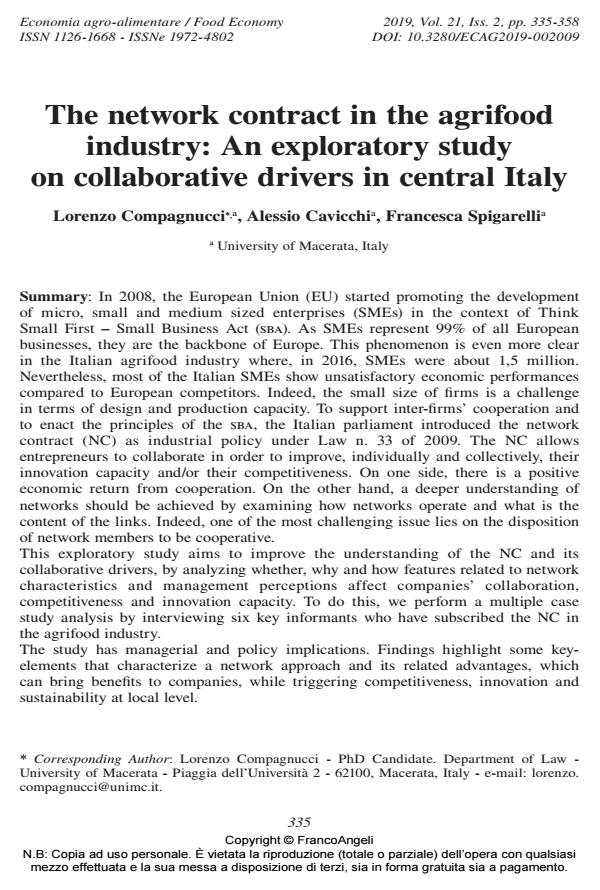The network contract in the agrifood industry: An exploratory study on collaborative drivers in central Italy
Titolo Rivista ECONOMIA AGRO-ALIMENTARE
Autori/Curatori Lorenzo Compagnucci, Alessio Cavicchi, Francesca Spigarelli
Anno di pubblicazione 2019 Fascicolo 2019/2
Lingua Inglese Numero pagine 24 P. 335-358 Dimensione file 155 KB
DOI 10.3280/ECAG2019-002009
Il DOI è il codice a barre della proprietà intellettuale: per saperne di più
clicca qui
Qui sotto puoi vedere in anteprima la prima pagina di questo articolo.
Se questo articolo ti interessa, lo puoi acquistare (e scaricare in formato pdf) seguendo le facili indicazioni per acquistare il download credit. Acquista Download Credits per scaricare questo Articolo in formato PDF

FrancoAngeli è membro della Publishers International Linking Association, Inc (PILA)associazione indipendente e non profit per facilitare (attraverso i servizi tecnologici implementati da CrossRef.org) l’accesso degli studiosi ai contenuti digitali nelle pubblicazioni professionali e scientifiche
In 2008, the European Union (EU) started promoting the development of micro, small and medium sized enterprises (SMEs) in the context of Think Small First - Small Business Act (sba). As SMEs represent 99% of all European businesses, they are the backbone of Europe. This phenomenon is even more clear in the Italian agrifood industry where, in 2016, SMEs were about 1,5 million. Nevertheless, most of the Italian SMEs show unsatisfactory economic performances compared to European competitors. Indeed, the small size of firms is a challenge in terms of design and production capacity. To support inter-firms’ cooperation and to enact the principles of the sba, the Italian parliament introduced the network contract (NC) as industrial policy under Law n. 33 of 2009. The NC allows entrepreneurs to collaborate in order to improve, individually and collectively, their innovation capacity and/or their competitiveness. On one side, there is a positive economic return from cooperation. On the other hand, a deeper understanding of networks should be achieved by examining how networks operate and what is the content of the links. Indeed, one of the most challenging issue lies on the disposition of network members to be cooperative. This exploratory study aims to improve the understanding of the NC and its collaborative drivers, by analyzing whether, why and how features related to network characteristics and management perceptions affect companies’ collaboration, competitiveness and innovation capacity. To do this, we perform a multiple case study analysis by interviewing six key informants who have subscribed the NC in the agrifood industry. The study has managerial and policy implications. Findings highlight some keyelements that characterize a network approach and its related advantages, which can bring benefits to companies, while triggering competitiveness, innovation and sustainability at local level. .
Parole chiave:Agrifood industry, innovation, Italy, networks, network-based contract
Jel codes:Q13, Q18, L14
Lorenzo Compagnucci, Alessio Cavicchi, Francesca Spigarelli, The network contract in the agrifood industry: An exploratory study on collaborative drivers in central Italy in "ECONOMIA AGRO-ALIMENTARE" 2/2019, pp 335-358, DOI: 10.3280/ECAG2019-002009